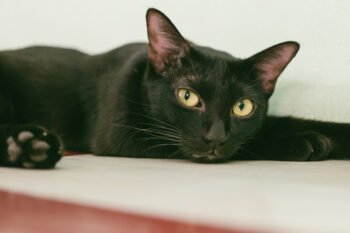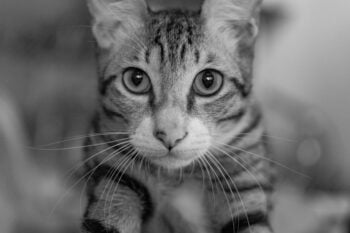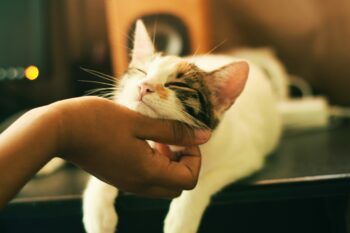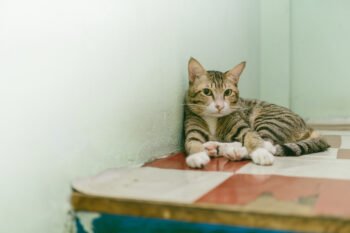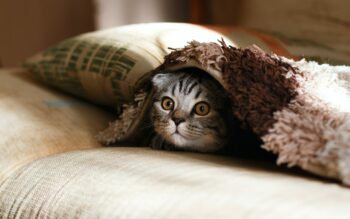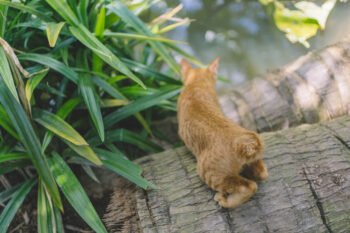Writers from mystery novelist P.D. James to science-fiction icon Ray Bradbury and numerous others have at least one thing in common: They all love cats. Why is it that so many literary types gravitate toward felines? Here are a few possible reasons:
1. Cats inspire us.
Recently I met SARK, aka Susan Ariel Rainbow Kennedy, the best-selling author of A Creative Companion and other books. We were at an NPR radio show taping, and she had just finished telling a story about her now-deceased — yet never forgotten — cat, Jupiter.
In 1989, SARK wrote down some inspirational thoughts about “How to Be an Artist.” They included lines like, “Stay loose” and “Invite someone dangerous to tea.” She put them on a scrap of paper and placed it on a wall in her home. Every morning, Jupiter would paw at the list, until one day it fell down. SARK paid attention and created a poster using the list. It sold more than 1,000 copies in a week and led to a lucrative publishing company contract.
2. Cats and authors admire each other.
Canadian novelist and playwright Robertson Davies famously once wrote, “Authors like cats because they are such quiet, loveable, wise creatures, and cats like authors for the same reasons.”
Publisher Janet Mills named her Amber-Allen Publishing company after one of her beloved cats, Amber, and her good friend Marc Allen. Mills published all of don Miguel Ruiz’s best sellers, books by Deepak Chopra, and has also written popular books, such as The Power of a Woman: Timeless Thoughts on a Woman’s Inner Strengths. “Cats represent the most beautiful qualities. They exude wisdom, calm, grace and pride,” said Mills.
3. Cats give us permission to play and laugh.
Mills joked that her cat Anjali “silently lets me know that the house needs cleaning when she squeezes under furniture and comes out looking like a dust mop. She makes me laugh.”
Such pleasures appear to be timeless. During the Renaissance period, French author Michel de Montaigne used to take breaks to spend time with his cat. He later wrote, “When I play with my cat, who knows whether she is not amusing herself with me more than I with her?” When poet and novelist Sir Walter Scott constructed a house in Italy, he made it an exact replica of his original home to avoid upsetting the comforting routine he and his cat shared.
4. Cats help us to confront challenges.
Routines, however, can be upset by unwanted happenings, such as illness. Nancy Carleton, editor of famous works by Dan Millman, Lynn Andrews, John Robbins, Sanaya Roman, Terry Lynn Taylor and many other well-known authors, is also a talented writer who has contributed to Taylor’s Angel books. In recent years, Carleton has been fighting a serious illness, but has gained strength from cats and other pets.
Carleton specifically talked about Luna, a cat that came into the hearts of her and healthmate Susan Hunter one dark and stormy night. She also recalled Sheba, a “beautiful black, long-haired cat” who was with her and Hunter during the last year or two of Sheba’s life. The cat was very elderly when she chose to live in Carleton’s home.
Carleton was present when Sheba had to be euthanized, something she’d experienced before with another cat named Tappy. “It was a very moving experience being with both of them and giving them love and blessings as they left their bodies,” she said. The moments helped her to “never doubt that the spirit goes on after death.”
The author/cat connection therefore runs very deep. Many of your favorite books were probably written and published by individuals who had a cat nearby for inspiration, companionship, comfort and so much more. Don’t discount the cat contribution either. As poet Dilys Laing once wrote, “I put down my book, The Meaning of Zen, and see the cat smiling into her fur as she delicately combs it with her rough pink tongue. ‘Cat, I would lend you this book to study but it appears you have already read it.’ She looks up and gives me her full gaze. ‘Don’t be ridiculous,’ she purrs, ‘I wrote it.’”

